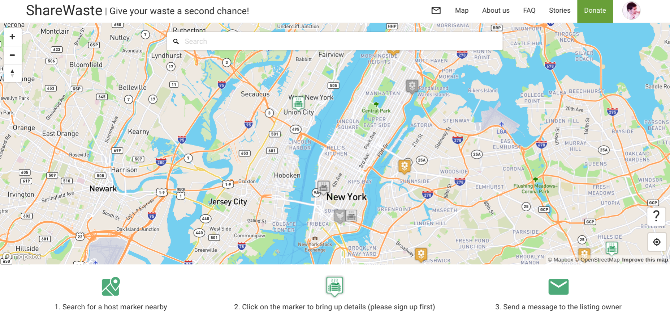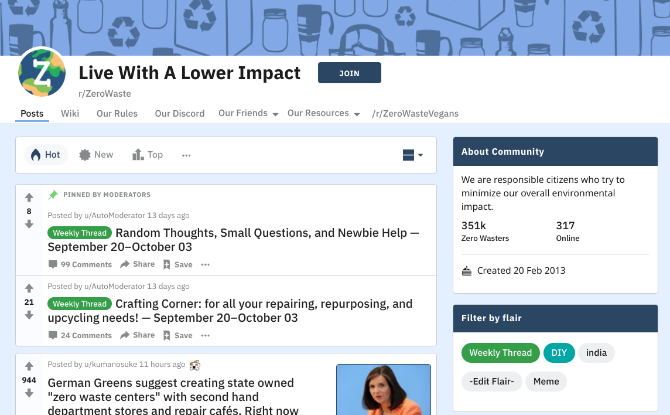Most of us are wasting more than we should be, from food and beverages to clothes and electronics. These five sites and apps will teach you to reduce waste, be more environmentally friendly, and even adopt a zero waste lifestyle.
The modern consumerist lifestyle encourages us to waste more than we should be. Functioning products are sometimes discarded instead of repairing or repurposing them. We need to learn the principles of repurpose, reuse, and upcycle to reduce this unnecessary wastage. The Zero Waste movement is a great place to start learning how to lead a more sustainable lifestyle.
1. Going Zero Waste (Web): Beginner’s Guides for Reducing Waste

If you’ve decided to start the zero waste journey, one of the first places you should visit is the Going Zero Waste blog. Writer Kathryn helps you ease into the process by striving for better choices, not perfection from the get-go. It’s this kind of simple and accessible philosophy that will make these habits more sustainable.
Going Zero Waste’s guide of blog posts for beginners covers everything you would need to know. These five posts lay the foundation of how to reduce waste from your lifestyle choices. The idea is to start with individual actions, slowly graduate to community actions, and eventually try activism if you feel like.
I’d recommend also going through the blog post on things to know before going zero waste. It’s an honest portrayal of the sacrifices and lifestyle changes in your future.
If you’re sure you want to go through with it, take the Zero Waste Challenge. It’s a 31-day activity with a free booklet to test your commitment. And there’s a zero-waste challenge for kids too if you want to get your young ones involved.
2. Too Good To Go (Android, iOS): Buy Surplus Foods for Big Discounts
Fresh food items like baked goods or groceries can go bad if unused. Storeowners are looking to sell these rather than throw them away, and that too at big discounts. Too Good To Go (TGTG) will show you where you can save money while saving food from being wasted.
It’s such a simple and win-win concept. Restaurants, bakeries, supermarkets, and cafes sign up for the app and list their unsold food items. You log in, browse these offerings, buy what you want, and go collect it from the store. Naturally, you’ll see most activity on the app at the end of the day.
TGTG has newly launched in New York and plans to expand to other areas in America soon. It already has an active and robust network in the UK and European countries.
Too Good To Go has inspired several spin-offs in other countries where the app isn’t available. For example, Australia now has Bring Me Home. If TGTG isn’t active in your area, search online for other services, there might already be an alternative.
Download: Too Good To Go for Android | iOS (Free)
3. Eat by Date and Still Tasty (Web): Are Expired Food Packets Still Safe to Eat?

You can sniff some foodstuffs like milk to immediately tell whether it’s spoilt. Such items usually come with an expiration date. But many other foods and beverages sport a “best by”, “best before”, “use by”, or “sell by” date. None of these indicate the food is spoilt, so you might want to double-check whether it’s still usable.
Eat by Date and Still Tasty are directories of safety information about different foods and food products. You can quickly search the database or browse by categories like dairy, drinks, fruits, grains, proteins, vegetables, and others. The repositories include things like baby formula, pantry essentials, packaged bottles, etc.
On each page, you’ll find different formulas for the product depending on its condition. For example, if it’s opened or unopened, stored in a pantry or fridge, and so on. You’ll also get real-world indicators of how to tell if it’s bad, rotten, or spoiled, as well as further tips on how to extend its shelf life. The next time you’re tempted to throw out some food because it’s past its best by date, check these websites first.
4. ShareWaste (Web, Android, iOS): Share Organic Waste With Composters

One of the tenets of reducing waste is composting. Instead of sending food waste to the landfill, turn it into soil or fertiliser. In your daily life, you produce a lot of organic scraps like coffee grounds, fruit peels, vegetable discards, etc. But it might not be possible to set up your own composting unit for you. So find someone who can use them through ShareWaste.
The app is a community map of those in the zero waste movement who want to help reduce food waste. You can sign up as a host (who has their own ways to use food scraps) or a donator (who will hand over scraps to the host). The map shows the nearest hosts, and you simply need to contact them and set up a drop-off.
While there are no guidelines on how to hand over food scraps, you can follow the most general rules like avoiding plastic, storing it in the freezer till the next drop-off, etc. Also read ShareWaste’s FAQs on how to be a good host and a good donor, so that the community comes together and reduces waste.
Download: ShareWaste for Android | iOS (Free)
5. r/ZeroWaste (Web): Online Community Forum for Discussions

Reddit has a large number of communities dedicated to sustainable living and environment-friendly choices. If you want to start with zero waste, then the r/ZeroWaste subreddit is a good starting point for beginners.
The Resources bar is the most important item to check. In that, you’ll find a large wiki of Zero Waste Alternatives explaining how you can reduce waste in different areas of your life, like clothing, bathroom, groceries, cooking, pets, transportation, etc. Heck, there are so many ways to reuse waste paper. And the Opportunities list tells you country-wise and city-wise zero waste locations.
The subreddit also has an active Discord chatroom to talk with like-minded people. It’s one of the best ways to discover zero-waste champions in your locality or city.
The more you get into zero-waste and sustainability, the more you’ll find similar off-shoot movements. For example, there is an anti-consumption movement that has a different philosophy for reducing waste. And there is the vegan zero-waste drive, the repurpose-recycle-reuse movement, and other such communities with similar goals but with specific parallel thoughts. Through r/ZeroWaste, you’ll discover more of these and find a group and philosophy that is closer to your ideals.
Be an Aware, Ethical Consumer
If there is one takeaway from these tools, it’s that reducing waste in daily life is easier than you previously thought. Importantly, it doesn’t need to be an all-or-nothing lifestyle change. You can ease into it by making smaller changes before leading up to big ones. And the onus isn’t on you alone, you can rely on your community to lend a hand.
Small steps help sustain new habits than large sweeping changes. Another step in waste management is to buy quality, ethical products. The clothes you buy, the software you install, the everyday items you purchase have all got alternatives that are better for the world. It’s just a matter of finding them.



